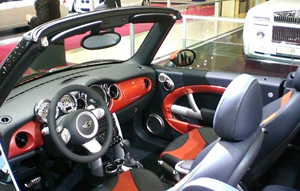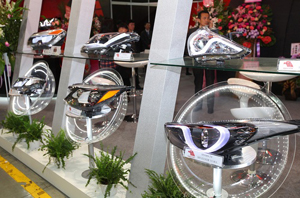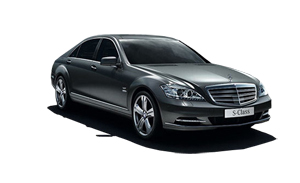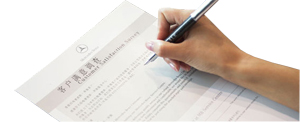Steady Growth of Car Ownership Boosts Chinese Aftermarket
China is expected to become the world's largest auto parts aftermarket in 2015
2013/09/25 | By Michelle Hsu
Although the growth of car sales in China has slowed in recent years, the steady increase in car ownership there has continuously boosted demand for vehicle maintenance and repair services. The result has been an accelerated growth in the number of car service outlets and in the demand for aftermarket parts.
Statistics show that China's auto parts sales grew by 11.9% last year, higher than the growth of vehicle sales. The China Research Network (CIRN) estimates that in 2015, China will surpass the U.S. to become the world's largest aftermarket for the automobile industry.
CIRN pointed out that China's current car ownership stands at 114 million, and that the value of the country's auto parts market will reach almost 1.5 trillion yuan within three years. Statistics show that an automobile costing 100,000-plus yuan will accrue an annual bill of over 3,000 yuan for repairs, maintenance, and cosmetics, and that the costs for middle- and higher-end models will be even higher. The annual market value of China's car care and auto cosmetics is now conservatively estimated at almost 400 billion yuan.
Areas subject to deepening urbanization, where households have more disposable income, are driving the steady growth of the automobile industry and providing substantial support for the growth of the parts aftermarket.

Potential Market
Areas with relatively high sales of auto parts are East China (35%), South China (12%), and the Northeast (19%), while the areas with the most development potential are the Southwest, the Northwest, the Northeast, and North China. These regions may well become the driving force for future development of the aftermarket services.
In areas with mature automobile markets like the U.S. and Europe, new car sales contribute about 20% of total industry profits while spare parts and components account for another 20% and the remaining 60% comes from related services. In other words, the profits from after-sales services—car insurance, financing, repair and maintenance, and so on--are generally about three times those from new car sales.
Barriers Blocking the Way
Compared with Europe and the United States, China's automobile aftermarket is still in the fledgling stage, with relevant laws, regulations, and standards not yet in place. The after-sales service industry basically exists in a legal vacuum, which hampers growth. Car repairs, parts, cosmetics, and accessories lack not only guiding norms but even standards for product quality and pricing. These shortcomings have a serious impact on the overall development of China's automotive after-sales service market.
The somewhat confused state of the domestic after-sales service industry hinders the normal growth of companies in this field. China currently has more than 130 vehicle manufacturers, tens of thousands of parts manufacturers, and countless numbers of other workshops dealing in automotive aftermarket services and related businesses. Most are small in scale and not very professional.
Thanks to restrictive rules on sales and brands in major cities, as well as such factors as fierce competition between brands in first-, second-, and third-tier cities, profits from new car sales have become weak. Profits in after-sales services, by contrast, are much higher, leading many car dealers to sacrifice profits on new car sales for opportunities in after-sales services. They earn little profit from the sale of new cars, but gain plenty of business opportunities after the cars are sold.

The Emergence of 4S Stores
According to CIRN's analysis, China has seen a rapid rise in 4S after-sales service shops in recent years, mainly because car sales have slowed down, the retail parts environment has becomes more complex, and profits from new vehicle sales have declined. So dealers have turned their attention to after-sales repair and maintenance, and car sales and service sales have become the automotive industry's two main sources of income.
“4S” refers to Sales, Spare parts, Services, and Surveys--an integrated four-in-one automotive after-sales service industry model. The 4S concept originated when European businesses entered the China market in 1998; Mercedes Benz opened the first 4S store in Beijing, and many other brands followed suite. Once it arrived in China, the 4S concept spread rapidly.
CIRN believes that this trend will bring more business opportunities to brand parts operators such as the Toyota-owned CWORKS, which last year saw a 2.5-fold growth in turnover. 4S shops catering to the supply of parts and after-sales services for a single type of vehicle enjoy a clear advantage.
As competition continues to expand, 4S shops are increasingly focusing on the establishment of brand-product services. Because 4S shops are backed by car manufacturers, the supply of spare parts is not a problem for them; since they work in close cooperation with vehicle makers, they are able to get parts to the consumer swiftly and efficiently.
Working in conjunction with 4S shops, car accessory suppliers need product marketing that reaches “full and fine” standards. “Full” means that suppliers not only need to provide 4S outlets with automotive electronics such as car audios, anti-theft equipment, GPS devices, tire pressure detectors, and reverse radar, but also offer cosmetic treatment, decorative modification, explosion-proof film, and so on—in short, everything that an owner might want after buying a car.
“Fine” means 4S stores will generally offer only a small number of brands in each product category, selected to give an advantage over other products in quality or cost, or both. To meet the needs of 4S shops, automotive suppliers need to achieve a product structure which is both “full' and ‘fine.”





